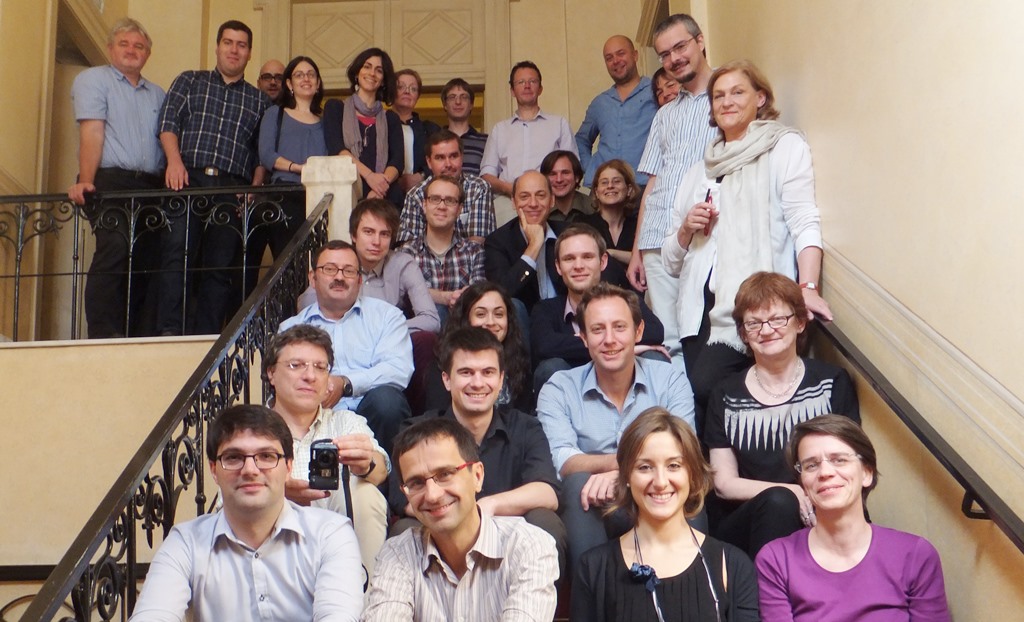| The ImPRovE Consortium consists of a growing number of partners which cover together a large number of countries. It is coordinated by the Herman Deleeck Centre for Social Policy at the University of Antwerp (CSB). | |
 |
The Consortium consists of various types of partners. 9 research groups in 7 countries are direct beneficiaries from the FP7 research grant. Apart from CSB (BE), these are OASeS (BE), AUEB (EL), CASE (UK), ISER (UK), TARKI (HU), UNIURB (IT), UTURKU (FI), and WUW (AT). In addition, PSiTIC, a Spanish research centre, has joined the project as a voluntary partner, contributing with research to work package 13 on reference budgets.Furthermore, there are direct links with two other partners. STATEC, the Statistical office of Luxembourg, directly applies the method developed in work package 13 on reference budgets in Luxembourg and is helped by ImPRovE for doing so. Finally, the Finnish National Institute for Health and Welfare participates in the ImPRovE project meetings and has contributed on a voluntary basis a paper in the context of work package 2. |
Our Partners:
Herman Deleeck Centre for Social Policy (CSB), Belgium
The Centre for Social Policy (CSB) was established in 1972 and is an interdisciplinary research centre within the Faculty of Political and Social Sciences of the University of Antwerp (UA). The Centre’s principal objective is to measure the effectiveness and to evaluate the adequacy of social policies under changing demographic, economic and social conditions. To this end, CSB collects and analyses data on how social policy and the social security system affect the income distribution and financial poverty. More »
Centre on Inequality, Poverty, Social Exclusion and the City (OASeS), Belgium
OASeS is a research centre within the UA Faculty of Political and Social. During the twenty years of its existence, it has developed a strong and nationally as well as internationally recognised sociological research tradition in the fields of urban sociology and poverty and inequalities studies. OASeS is well-recognised for its scientifically grounded advice on poverty and urban policy to various cities and province, the Belgian regional and national governments and the EC. More »
Athens University Of Economics And Business (AUEB), Greece
The Athens University of Economics and Business (AUEB) was established in 1920 and is the oldest higher education institution in the fields of Economics and Business Administration in Greece. The researchers involved in the project are from the Department of International and European Economic Studies that was established in 1990 and specialises, among other topics, in issues of European integration, European economic policies using multidisciplinary approaches. More »
TÁRKI Social Research Institute (TÁRKI), Hungary
TÁRKI Social Research Institute was founded in 1985 as an employee-owned, nonpartisan research centre. The institute conducts applied social research on a wide range of issues related to social stratification, labour markets, income distribution, intergenerational transfers, tax-benefit systems, consumption and lifestyle patterns and attitudes. TÁRKI places a strong emphasis on comparative analyses and provides expertise to national and international policy makers on European social structure, income distribution, social mobility and attitudes as well as on the operation of national social welfare regimes. More »
Centre for Analysis of Social Exclusion (CASE), UK
The Centre for Analysis of Social Exclusion (CASE), established in October 1997, is a multi- disciplinary research centre located within the Suntory and Toyota International Centres for Economics and Related Disciplines (STICERD) at the London School of Economics and Political Science. The focus of research undertaken in CASE is on the exploration of different dimensions of social disadvantage, particularly from longitudinal and neighbourhood perspectives, and examination of the impact of public policy. CASE’s research has always had a strong policy focus. Publications can be downloaded from its internet site http://sticerd.lse.ac.uk/case. More »
Institute for Social and Economic Research (ISER), UK
ISER is an interdisciplinary department of the University of Essex that brings together economists, sociologists, statisticians and other social scientists. As well as specialising in the production and analysis of longitudinal data – evidence which tracks changes in the lives of the same individuals over time – ISER contributes to cross-national research, through its own interdisciplinary research programme and the development of research resources. ISER includes the Microsimulation Unit that develops and maintains a UK microsimulation tax-benefit model and coordinates the development of EUROMOD. More »
Institute for Multilevel Governance and Development/WU Wien (WUW), Austria
The Wirtschaftsuniversität Wien (Vienna University of Economics and Business) is the biggest European university specialised in economics and business administration. It is an EQUIS accredited public institution employing approximately 400 researchers in a broad range of disciplines relevant for economic and business issues and teaching more than 20.000 students. The university has strong international ties and has accumulated considerable experience in the coordination and administration of EU-funded projects. The Institute for Multilevel Governance and Development is a social science teaching and research unit specialised in studying local and regional governance from an interdisciplinary perspective. The institute has also become familiar with managing EU projects and accumulated knowledge due to an experienced administrative and financial management. More »
Universita’ degli Studi di Urbino Carlo Bo (UNIURB), Italy
The DESP (Department of Economics, Society and Politics) is an interdisciplinary Department at the University of Urbino established in January 2011 out of the merger of the Institutes of “Sociology”, “Political Economy”, “Business administration” and “Political Science” Law” based previously in the respective Faculties. More »
University of Turku (TURKU), Finland
The Social Sciences Faculty at Turku University, launched in 1967, offers facilities for the study of all the central social science disciplines, and of psychology. There are ten subjects available as majors within the Faculty: the social science disciplines of philosophy, contemporary political history, political science, social policy, social work, sociology, economic sociology, logopedics and statistics; the Master’s programme in biostatistics; and psychology. In addition, the Faculty operates several multidisciplinary programmes with a problem-centred approach, such as Asian Studies, European Studies, and postgraduate programmes in migration and multiculturalism, or in social gerontology. There are at present altogether 1800 students working for degrees within the Faculty, one sixth of these in graduate school beyond the Master’s degree. At the undergraduate level the Faculty offers both the Bachelor’s and the Master’s degree (in Finland most university curricula lead without a break to the Master’s level). In 2010 social policy, social work, sociology, economic sociology and statistics formed the Department of Social Research. More »
Research Group of Social Pedagogy and Information and Communication Technologies (PSiTIC), Spain
The PSiTIC investigation group of the University Ramón Lllull of Barcelona, develops its investigation, formative and transfer knowledge activities and services, around the new socioeducative community paradigms, inclusive and in net, and specifically around the quality and the upholding of the transformation processes and educational innovation, with the support of the new technologies of information and communication. It is in this sense that our investigation studies, from the different angles, the new challenges of the XXI century education, which are recognised internationally as the paradigms of “Life Wide Learning” and “Ubiquitous Learning Society”. More »
Center for Research in Participation, Social Movements and Collective Action (NEPAC), Brazil
The Center for Research in Participation, Social Movements and Collective Action (NEPAC-UNICAMP) is linked to the Graduate Program in Political Science, Institute of Philosophy and Human Sciences (IFCH), the State University of Campinas and brings together students and researchers undergraduate, master’s and doctoral active in Political Science, predominantly, Social Anthropology and Social Sciences. Created in 2008, NEPAC develops investigations in participatory democracy, social movements and collective action. Our main focus of analysis is the relationship between social movements and political institutions and its implications on the formulation processes of public policies and expansion of citizenship rights.. More »

